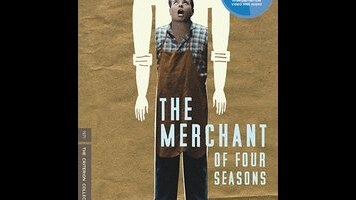“Frische birnen! Frische birnen!” shouts Hans Epp, barrel-chested, short-necked disgraced ex-policeman, his mouth hung open in a donkey-like bray. “Frische birnen” is German for “fresh pears,” and Hans, played by Hans Hirschmüller, is working as a street vendor, dragging a cumbersomely symbolic fruit cart around the apartment blocks of West Germany. He is the protagonist of Rainer Werner Fassbinder’s The Merchant Of Four Seasons: a born loser, part comic-strip character—the kind that always gets bonked on the head in the last panel—and part epic theater archetype.
Decades of film courses and retrospectives have drilled in Sirk as the go-to reference for florid, double-meaning style, but in 1971, the reference was radical, in part because it was so deeply uncool. In fact, one thing that’s still kind of amazing about The Merchant Of Four Seasons is how thoroughly it eschews anything resembling hipness, especially when compared to Fassbinder’s early black-and-white deconstructed gangster movies (Love Is Colder Than Death, Gods Of The Plague, The American Soldier) or to Beware Of A Holy Whore, his great meta-movie about a troubled film production, with its flashy tracking shots and its soundtrack of choice Leonard Cohen cuts.
Movies by young directors are expected to be jazzy, authentic, and on-trend, and The Merchant Of Four Seasons is none of those things. Like the mature work that would follow, it shuttles between serious melodrama and black comedy without ever stopping over in camp. (However, the movie’s violence, which includes some of the fakest stage slaps ever committed to film, comes close.) The subject is frustration and repression, drawn broadly and mercilessly. Hans—wife-beater, caricature of stunted manhood, treated like shit by his middle-class family—tries to make a little happiness of his own, and fails miserably.
On paper, it sounds like kitchen-sink drama, but it plays as something both stranger and darker, the stark artificiality of its vision somehow enhanced by the rickety production values, dubbed dialogue, and stilted sense of movement. (Hanna Schygulla, the most gifted member of Fassbinder’s regular company, shows up in a few scenes to act circles around the rest of the cast.) “Non-realistic realism” might sound like a contradiction in terms, but it’s about as accurate a category as one could invent for the film. Idiosyncratic and imperfectly realized, like much of its writer-director’s most thrilling work, it’s an unreal movie informed by a profound sharpness about real life. As the camera awkwardly dollies in on Hans, his face covered in too much makeup, his voice out of sync with his lips, the strained, uneasy squint of his eyes comes into focus as pure figuration. He’s a cartoon—but what a cartoon.
The Merchant Of Four Seasons is available on Blu-ray and DVD from Criterion. It’s also currently streaming on Hulu Plus.

